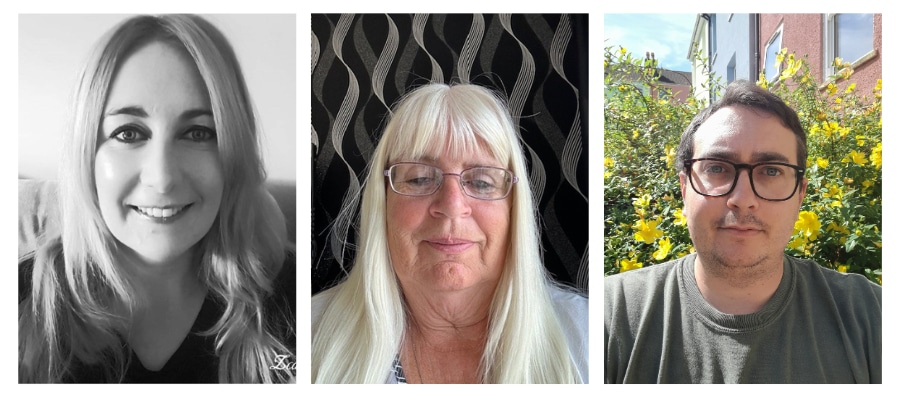The power of peers
Kate Thomas, the Peer Support Officer at Second Step, along with two peer workers, Lynn and Boaz, share their insights into the transformative power of peer work. They discuss what drew them to this field and why it holds such profound significance.
Kate explains how peer workers play a vital role at Second Step in various services, and unlike traditional support roles, are uniquely positioned to connect through shared understanding. “They are people who have lived experience of mental health difficulties, trauma, or substance abuse and use their personal journeys to support others facing similar challenges. I found out about peer work from a peer worker when I was staying in a housing project myself.”
Why peer work?
Lynn works for Somerset Wellbeing Service and Boaz works for the South Assessment and Recovery Team. They were both drawn to peer work by the opportunity to share their lived experience in a way that could help others. Lynn’s journey began when she volunteered at Second Step. She cherished the feedback from people who said, “You understand, you know.” She wanted to pass on the support she had received herself.
Boaz had previously worked in non-peer mental health roles where sharing personal experiences was discouraged. He was attracted to the prospect of using what he considered his ‘best assets’ – the valuable insights from his own recovery journey. Like Kate, by becoming peer workers, they were both able to use the wisdom they had gained through their own struggles to inspire hope and courage and growth in others on similar paths.
Building trust
As Lynn explains, peer workers develop relationships with clients over several months, meeting them in comfortable environments like cafes or their homes or on the phone if that’s what they prefer. “I get referrals for people who have low to medium risk of suicide, have suicidal thoughts, or have made a plan but don’t intend to act on it immediately,” she says. She contacts them, explains who she is and what she does and asks them if they would like support. This is the first step, and sometimes people say no. It’s a gradual process and relies on slowly building trust. Sharing the peer workers’ own stories can be a big part of that process. Lynn adds that it’s important for her to let clients know she will always get back to them as soon as she can, and that she sticks to that promise.
The importance of listening
While professional expertise is invaluable, peer workers offer something additional – the ability to say, “I understand, I’ve been there.” This connection is powerful, allowing clients to open up and see their potential mirrored in someone who has overcome similar challenges. As Boaz reflects, ” People often ask, ‘If you were able to visit yourself in the past, what would you tell yourself?’ Well, you can’t do that exactly, but being able to tell other people in a similar position what you have learned through your experiences is very rewarding.”
Lynn tells the transformative journey of one client – a young mother grappling with childhood trauma, relationship tensions, and housing instability. Through their work together, the client regained autonomy, repaired bonds with her children, and blossomed into “a completely different person.” Experiences like these highlight why empathy, honesty, and excellent listening skills are essential peer worker qualities.
Mutual growth and inspiration
The peer relationship is reciprocal, benefiting both parties. As Boaz notes, “Recovery can lead to greater growth and transformation than someone had before they became unwell. Peer workers are often good at inspiring this, having gone through it themselves.” Meanwhile, Lynn says her role helps her manage her own wellbeing and “reminds me how to look after myself.” Peer work is validating for everyone involved.
Perhaps most remarkably, in the two and a half years since Lynn started her role, they haven’t lost a single client to suicide. This is a real testament to the impact peer support can have.
Diverse areas of peer support
While suicide prevention is a crucial aspect of peer work, it’s important to note that peer workers contribute their valuable skills and experiences across various other areas as well. Early intervention services benefit from peer support, helping individuals address mental health challenges before they escalate. In high support accommodation settings, peers play a vital role in assisting residents with day-to-day living and recovery. Additionally, peer workers are integral to assessment and recovery teams, offering unique insights that complement traditional clinical approaches. These diverse areas of peer work highlight the versatility and importance of lived experience in supporting individuals throughout their mental health journeys.
An undervalued, privileged role
Despite its clear value, peer work often goes unrecognised. “I really think peer work is undervalued,” Lynn says. But things are starting to change. Other professionals are beginning to see the value of peer work, which she views as a very positive step. “Peer work is extremely valuable and that’s the message we need to spread. We are professionals with a recognised qualification – we’re not just people off the street.”
Boaz adds, “I get a huge sense of gratitude out of peer work. Being in a position where you have an opportunity to make a difference in the lives of others is a privilege.”
The majority of peers have been through Second Step’s own in-house training, while others have also completed the Higher Education England Training with Exeter University. All peers are supported through regular supervision and reflective practice.
Kate concludes, “Peer workers aren’t simply people with shared experience – they are trained professionals offering a unique, privileged relationship that can be truly life-changing. As our peer workers demonstrate, their role deserves to be understood, valued, and championed widely.”
To find out more about becoming a peer worker with Second Step, contact Kate.thomas@second-step.co.uk.

